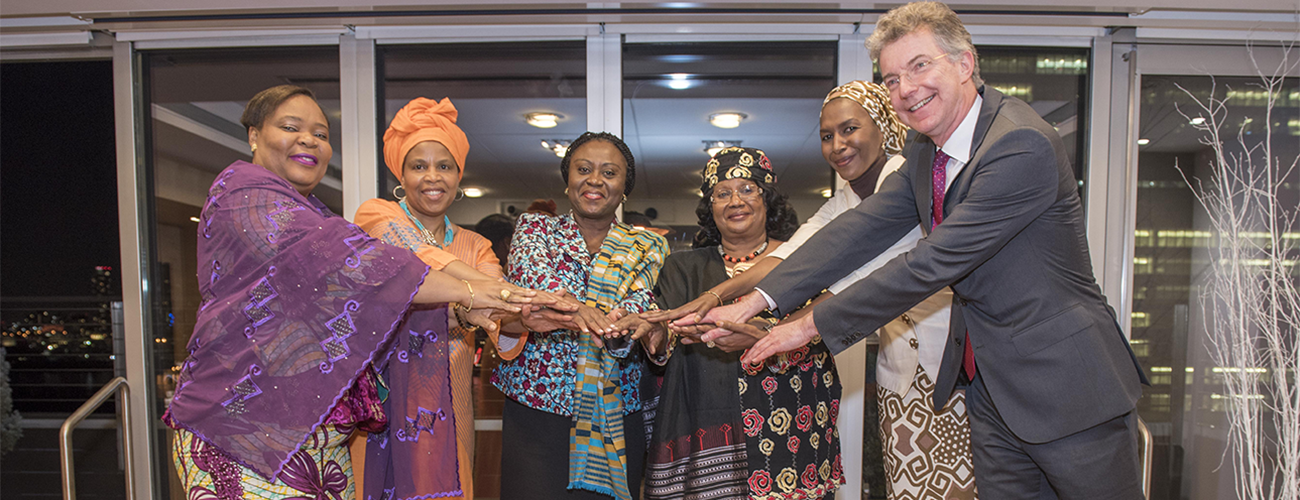Celebrating a new platform to elevate the representation of African women leaders in the pursuit of peace, security, and development, the African Women Leaders Network (AWLN) launched its New York Group of Friends at IPI on February 27th.
Fatima K. Mohammed, Permanent Observer of the African Union to the UN, gave some context to the significance of the launch, saying it “demonstrates that Africa and the international community are fully committed to pool efforts and work together to enhance the role and leadership of women in the transformative agenda.” The group’s aim will be, “improving lives, the well-being of women and girls, and the people of our continent.”
She lamented the dearth of African women’s voices in international relations and peace processes with a clear message. “When women fully participate,” she said, “be it in peace and security or development processes, we witness immediate and tangible results.”
Echoing this sentiment, Martha Pobee, Permanent Representative of Ghana to the UN, and Chair of the Group of Friends, introduced the network as “a platform to galvanize and boost women’s leadership in Africa for peace and development in all sectors and at all levels.” She described a main objective of the group as developing partnerships to “identify areas that will enhance the role and leadership of the network in advancing the women’s agenda in Africa with the focus on capacity-building and skills transfer.”
The advantage of African women’s participation in peace processes should not be underestimated, UN Women Chief of Staff, Khetsiwe Dlamini, stressed. “The Chinese have a proverb that says women hold up half the sky,” she said. “This network has brought forth women who have come to the forefront and are holding the sky up and calling other women to join them. Women are doing their part in Africa through this network.”
To further this message, Dr. Dlamini touted the network’s accomplishments since its inception in June of 2017. The network has created chapters in the Democratic Republic of the Congo (DRC), Côte d’Ivoire, Nigeria, Ghana, and Cameroon, and has helped Zimbabwe gather women in a solidarity meeting. The network “has been working very quietly in the background, as women often do, on Kenya and its transition to a new term for the president,” she said. The network has also been discussing with the African Union, “more inclusive and peaceful election processes.”
This growth in influence since the network’s establishment eight months ago is a testament to the innate capability of African women unhindered by unjust discrimination, she told the audience. “If you want a job done, give it to a woman; this is what they are saying to all of us,” she said. Quoting an Ethiopian proverb, she added, “Where a woman rules, streams run uphill, not downhill. Women are able to achieve the impossible with very little resources and very little noise, and no blood is shed.”
Building on this proverb, Christoph Heusgen, Permanent Representative of Germany to the UN and Vice-Chair of the Group of Friends, responded, “The Rhine in Germany still flows the same direction, but the chancellor is holding up the sky.” He revealed that the German Chancellor, Angela Merkel, in selecting new cabinet members, acknowledged the pressing need for women’s representation in the government. Consequently, he said, for the first time, there will be more women than men representing her party, the Christian Democrats, in the cabinet.
Nobel Peace Prize Recipient, Leymah Gbowee, then told a moving story about women’s influence, solidarity, and compassion in the face of systemic gender inequality. While leading a delegation of women through the DRC, she spoke to a hundred women, who shared stories of sexual violence. One after another, she related, the women would say, “‘I was raped, I wanted to kill myself, I felt there was no reason to live, and the women came, then I had hope.’”
The visiting women recounted how they “had held the hand of one other woman who had gone to rape, helped her to see life differently…and one after the other, gave hope for a new life in the midst of crisis for the rest of these women to begin to do something.”
It is with that spirit the African Women Leaders Network was founded, she said. “Women have been building peace from Liberia to Rwanda to Sudan. That solidarity is the spirit of our Africa.”
Joyce Banda, former President of the Republic of Malawi, gave historical context, saying, “We are not asking to participate in leadership now. We’ve always been leaders, even before colonization.” Women’s solidarity and leadership are not novel concepts, she explained. “This time around, we are saying, ‘We are here.’ Those of us who formed this network are saying, ‘We want to raise our voices on behalf of our women on the African continent.’
“It’s not acceptable that a woman should die giving life. It’s not acceptable that 130 million women are girls around the world who are not in school through no fault of their own,” she said.
To conclude, Fatima Mohammed read a prepared statement from Amina Mohammed, UN Deputy Secretary General, who expressed regret for her inability to attend. The statement read, “What we are building here is a movement—a movement for gender equality, a movement for peace, a movement for economic livelihoods, a movement for humanity. Thank you for being a part of it. Let’s keep the momentum going.”
Sarah Taylor, IPI Research Fellow, moderated.








